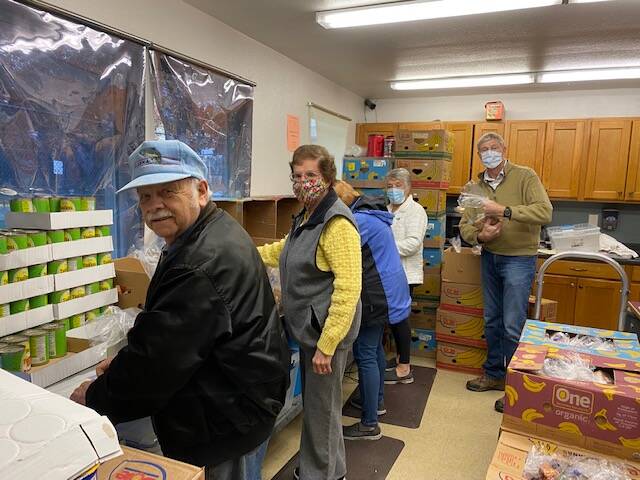One day a week for years, members of the Auburn Lions Club have been coming into the Auburn Food Bank to fill 420 plastic bags with food.
And every Friday during the school year, school counselors at each school receive 20 of the bags from the food bank, which they hand out to food insecure students so they won’t go hungry on weekends or three-day holidays when there is no school.
Breakfast, lunch and two snacks for each day out of school – kid=friendly, high protein, low sugar foods. Oatmeal, granola bars, breakfast bars, pop tarts, single serve cereal, mac ‘n cheese cups, tuna packets, cheese and peanut butter sandwich crackers. The district determines which kids receive the food.
Thirteen years from its start, the Food to Go (or Backpack) program —still known as the backpack program though now they are just plastic bags full of food —remains one of the Auburn Food Bank’s top priorities. But at $700 each week in food costs, it is also one of the food bank’s most expensive efforts.
“We put out about $700 a week for the Food to Go program because of the high protein, low sugars, single-serving kinds of food it calls for. Usually, those are a lot more expensive if you have to buy it that way and in bulk,” said director Debbie Christian.
Now the account from which the Food Bank has drawn most of the money to supply the food for all but one to two years is running low. There are concerns about the program’s long-term viability, according to Christian.
“In the beginning in 2007,” Christian explained, “we started paying for the program kind of out of our own budget. But about a year or two into it, we got an estate from a woman …I did not know her, but I when I started reading about her, I found she’d been a school teacher without any children, and she had always worked to make kids’ lives better. So the board decided to designate the money from her estate to pay for the program.”
Christian said everyone expected the fund to last seven years, but it’s lasted 13 years.
Christian and her staff are working hard to make it last as long as possible.
“I have been able to obtain a few extra grants,” Christian said. “I had a United Way grant come in. And every once in a while, someone wants to do a food drive, and we can ask them to do it specially for those kinds of foods so we can continue to get a donation in for it.
“We don’t want it to quit, we never want to see that happen. It’s just one of those priority things we have, and unfortunately it’s one of the most expensive ones we do,” Christian said.
Bill Kyle, president of the Auburn Food Bank Board in 2007, read about the Good-to-Go program, which started in Terrant County, Texas, and liked what he’d read. He approached Christian.
“I think we ought to pick this up and do it,” Kyle said.
Christian, who had been the food bank’s director for only about a year at that time and was still feeling her way into the job, recalled her reaction.
“You know, here I am, I’m brand new to the job, I don’t know what I’m doing, and I’m thinking, ‘I don’t know how to do this.’ It’s a big project, and I don’t know to to really get in touch with students or anything,” she said.
Christian approached one of the community’s movers and shakers, Arlene Pierini, director of the Communities in Schools program at the time, and explained to her what the food bank had in mind and what the new program would look like. Pierini got busy with the school part and got the school counselors involved.
“It’s definitely morphed over the years,” Christian said, noting that in the beginning, Mountainview High School leadership students packed the backpacks and even shopped for the food.
Christian would like to do more.
“The sad part about it is that we only have the capability to do 20 backpacks per school right now, and we really could do almost 100 per school if not more because there is that big of a need. But we have capacity issues, and I would have volunteer issues. And then there’s the driver who delivers those backpacks, that’s another issue, because just taking the 20 to each school is weight sensitive, there’s weight in that. So here’s one person trying to do 100 of those, and if you’re going to double up, you’ve got more problems and you’d need another driver so there’s just exponential growth in every piece of that.”
Contact
The Auburn Food Bank is at 930 18th Pl. NE. Phone: 253-833-8925. Web: www.theauburnfoodbank.org


